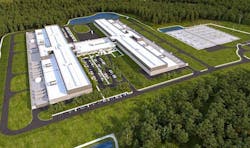Atlanta has emerged as the hot new destination for data centers. This week’s announcement that Facebook will build a $750 million data center in Newton County adds some hyperscale heat to the rising profile of the Atlanta region, which is already seeing new projects from providers targeting the enterprise market, as well as a healthy stream of sale-leaseback transactions.
“Atlanta is the central hub of business and connectivity for the entire Southeast, which is the fastest-growing region in the country,” said Dallas Whitaker, Chief Portfolio Manager for Carter Validus Mission-Critical REIT, which has a long history operating data centers in the Atlanta market. “I can’t think of anything that will impede that growth.”
The Facebook data center is the third huge campus announced in the region over the past year. In May 2017 Switch announced plans to invest $2.5 billion to build more than 1 million square feet of data center space in Douglas County. In December, Cyrus One confirmed plans to build a 44-acre campus in the Atlanta suburb of Douglasville, that will house 440,000 square feet of data center space.
The arrival of Facebook, CyrusOne and Switch signals growing confidence that Atlanta can now support wholesale data centers, and even hyperscale players. The Atlanta market was the focus of a panel discussion at the recent CAPRE Data Center Market Forecast event in Ashburn, Virginia.
The panelists expressed broad agreement that Atlanta is an ascendant market, and will see more demand for data center space. But the extent of the building boom in Atlanta has some industry veterans keeping a watchful eye on supply and demand. The Atlanta market historically has seen annual absorption rates of 6 to 10 megawatts (MWs) of data center space, compared to between 20 and 60 MWs for markets like Chicago, Dallas, Silicon Valley and Phoenix, and more than 100 MWs for Northern Virginia.
Reaching Beyond Atlanta
The trend line is moving higher, as Atlanta saw 13 MWs of space leased in 2017, up from 7 MWs in 2016, according to data from Jones LangLaSalle. UPDATE: That number will be higher for 2018, as in mid-March QTS Data Centers announced that it had signed lease renewals representing 19 MWs of capacity at its Atlanta-Metro data center.
One reason for optimism is that Atlanta is increasingly a regional market, attracting both local businesses and companies from elsewhere in the U.S.
“I think what we’ve seen in the last few years is out-of-market companies choosing Atlanta for their data center,” said Bob Kramlich, VP of Enterprise Services at T5 Data Centers, which operates a data center in Alpharetta, and recently announced plans for a $100 million facility in Lithia Springs in the city’s Western suburbs.
Indeed, the new players entering the market see Atlanta as a regional hub, and not a local market. Switch sees the potential for a similar dynamic to its hugely successful Las Vegas campus.
“Ninety five percent of our customers are from outside Las Vegas,” said Missy Young, the Chief Information Officer for Switch. “A lot of them are from California. The Southeast corner of the U.S. has roughly the same population as the state of California. We’re here to do business with 40 million people and their companies.”
CyrusOne Chief Technology Officer Kevin Timmons is bullish on the potential for the Atlanta market.
“It’s not hard to imagine Atlanta following in the footsteps of Northern Virginia,” said Timmons. “The fill rates for current data centers are very strong. There’s obviously a need, and I think there hasn’t been a product like ours in that market. We think someday Atlanta will be secondary to only the Northern Virginia market.”
Active Year for M&A, Expansion in 2017
The leading incumbent in the Atlanta market is QTS Data Centers, which operates a 1 million square foot data center in downtown Atlanta, as well as a facility in the suburbs in Suwannee.
“We have extremely strong leasing activity,” said Shelagh Montgomery, The EVP for Strategic Client Management at QTS. “We’ve really seen strong, consistent growth in Atlanta.”
The activity in Atlanta made for a busy 2017, in which existing players added capacity, and others entered the market through acquisitions and sale-leaseback transactions for enterprise facilities. Here’s a look at some of the highlights:
- Digital Realty, the world’s largest data center landlord, has expanded its presence downtown by adding 18,000 square feet of raised-floor colocation space in 250 Williams, a multi-tenant data center facility in downtown Atlanta.
- Several months after Digital Realty announced its expansion in the building, 250 Williams was acquired by data center REIT Carter Validus for $166 million.
- DataBank announced plans for a 93,000 square foot data center at Portman Holdings’ CODA development, a 645,000 square foot mixed-use complex currently under construction in Georgia Tech’s Technology Square.
- Serverfarm has recently acquired a 153,000 square foot facility in Suwannee, Georgia that had been owned by Advanced Micro Devices (AMD).
- Ascent Corp. entered the Atlanta market in 2017 through a sale/leaseback deal with an enterprise tenant. The ATL1 facility is a 185,000 square foot building on a 38-acre secure site in the Atlanta suburb of Alpharetta. A tenant occupies two data halls, but there is up to 8 MW of server-ready space, with the ability to add another 75,000 square feet of capacity if needed.
- In May, Lincoln Rackhouse said that it was acquiring a data center in the Atlanta market through another sale/leaseback agreement with a corporate tenant.
- Colocation provider Green House Data continued to build its national footprint with the April 2017 acquisition of Cirracore, an Atlanta-based infrastructure provider of Infrastructure-as-a-Service (IaaS) and hybrid cloud products.
In the downtown market, CAPRE panelists expected continued activity at 250 Williams Street, the 1 million square foot mixed-use building that once housed the headquarters for the 1996 Olympic Games. The building also includes 300,000 square feet of data center space, and has 130,000 SF of powered shell space available. While representing just 30 percent of the space, data center tenants generate 60 percent of the revenue. New owner Carter Validus says it will work to shift the tenant mix toward data center tenants.
The exterior of 250 Williams Street in downtown Atlanta, where Digital Realty is adding 50,000 square feet of data center space. (Photo: Digital Realty)
“I think we’ve got a pretty significant upside there,” said Whitaker. “This building has extreme infrastructure in place, and we’re hitting the market at a really good time.”
Other downtown data center hubs include 56 Marietta, which is owned by Digital Realty/Telx, its neighboring building at 55 Marietta, and 180 Peachtree Street, which Singapore’s Maplewood recently acquired from Carter Validus.
Creating A New Market
The new Facebook project is notable not just for its size, but for its location. Stanton Springs is in Newton County, about 40 miles East of downtown Atlanta.
“It’s breaking a brand new market that didn’t exist,” said Kramlich. “There aren’t any data centers out there.”
By 2020 there will be two new data centers on the Facebook campus, with about 970,000 square feet of space. The data center will be supported by renewable energy from the Walton Electric Membership Corporation (EMC), which will install hundreds of acres of solar panels on Georgia’s electric grid as part of a power supply agreement with Facebook.
Georgia’s power story is a critical part of its recent success, according to Tim Huffman, a Senior Vice President at CBRE, who said Georgia Power offers rates that can range from 5 cents per kilowatt hour (kWh) to as low as 3.5 cents per kWh. “The cost of power in Georgia is a key factor in what’s happening in Atlanta,” said Huffman.
Young said Switch is working on an agreement to provide renewable energy to support its new data center, but cited the importance of the Atlanta region’s energy profile. “The ability for Georgia Power to provide clean, renewable energy was a major reason we came to Atlanta,” she said.
At the CAPRE panel, Atlanta-area data center executives expressed optimism about the year to come.
“We see quite a mix of prospects,” said T5’s Kramlich. “In 2018, I think we’ll see a lot of growth and a whole variety of choices.”
“We’re seeing strong demand from healthcare,” said Allen Skipper, Vice President of Strategic Sales at Flexential (formerly Peak 10), which operates facilities in Alpharetta and Norcross, and is deploying a new data center design. “It’s easier to come in with 50,000 square feet than a million square feet,” he added.
Young says Switch has experience building a million square feet, and that new streams of demand from new technologies will generate even more data to store and manage.
“The pie just keeps getting bigger,” said Young. “Ninety percent of all data has been created in the last two years. There’s plenty of business to go around.”






